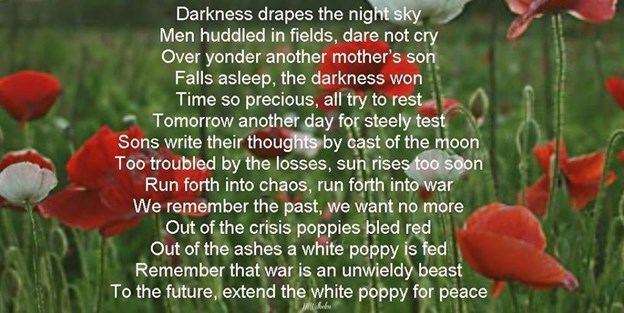By Maryann Wilhelm
There are little boxes sitting on various cashier shelves. They look insignificant, just a little box with a small hole. No one asks of anything about it. No one presses, no one points it out.
As adults, we've seen them so often that there is no question even why it is there. We accept its presence to the point that it simply becomes a backdrop sitting on cold hard steel. We're disconnected. The box becomes ordinary.
It looks quite ordinary until the fingers of a child stroke the red petals and she asks, "Can I have one?"
While scrounging to find my MasterCard, I hurriedly blurt, "Okay," giving no thoughts of the series of questions that are about to trample me as we walk away with a load of groceries.
With a swipe of my card, I load up the groceries. Still, I am racing for time, feeling that sense of panic to try and get out of the way for others to come through with their carts. It dawns on me, a question in my mind, "What would it have been like for those soldiers, for the nurses who were at the battlegrounds.”
My sense of panic to get out of the way, so insignificant to what these men and women of war experienced. A tinge of guilt for my unfounded feelings arise.
Little Evie asks, "Grandma, how come Dawnais didn't take one?"
I said, "I guess she didn't want it."
Dawnais said, "You’re supposed to buy it."
The little voice at my hips calls out, "How much do they cost?" In my mind, I am thinking it cost too many lives, but instead I said, "I don't have any coins to put it in the box"
Little Evie, "Why don't they tell you?" I said, "You’re supposed to know."
By this time, the car is loaded and the conversation continues.
"Who are the flowers for?" asks Evie as she fiddles with the red plastic, felt-coated poppy.
"The poppies are like pictures, they are there to help you remember the men and woman who went to war."
Dawnais adds, "Rememberance Day is in November."
Our conversation carries on as we drive away.
The conversation reminded me of a poem I wrote after becoming aware the Chippewa of Nawash (Cape Croker as it's also known) had the largest number of men that came from one community who went to both world wars
I sat with my thoughts to envision what it could have been like for these young soldiers being in a foreign land, fighting a war so far from home, and I wrote this poem that I’ve submitted (see image above).
Remember our history and know that volatility, envy and hate isn't exclusive to other countries.
There is a rise of anger in our world, moving across countries, into our communities, into our cities and it's against each other.
Online, our words, they can feel like poison. Those negative words can feed the flame of those unstable, someone angry enough to do harm.
Remember our wars and remember how strong our words can be. Use them wisely.
